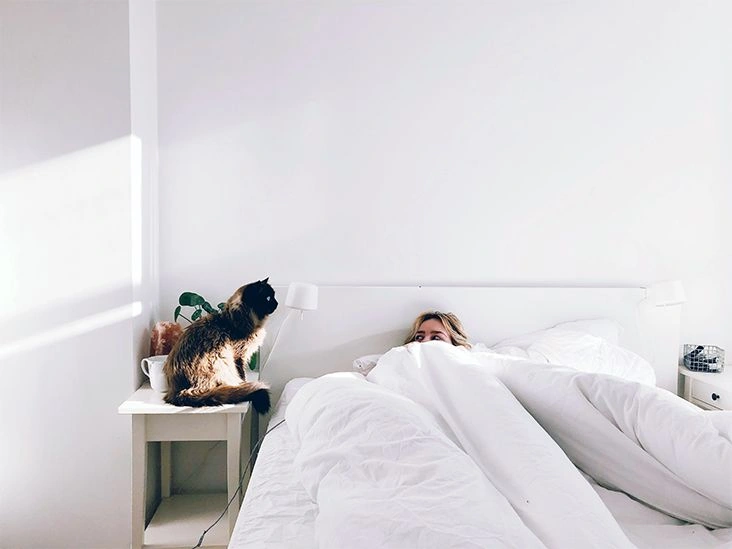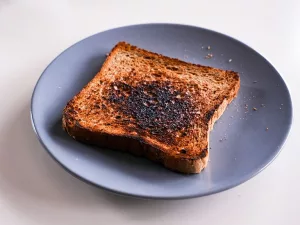Weighted blankets have become a popular tool for managing stress and promoting healthier sleep for many people — and for understandable reasons.
Below, we’ll look at how these blankets function and outline their potential advantages and drawbacks.

What is a weighted blanket?
Weighted blankets are therapeutic coverings that typically weigh between 5 and 30 pounds (2.3 to 13.6 kilograms). The extra mass usually comes from:
- plastic pellets
- glass beads
- small metal ball bearings
The downward force from this added weight replicates a therapeutic approach known as deep pressure stimulation or pressure therapy.
What are the benefits of using a weighted blanket?
Deep pressure stimulation applies gentle, distributed pressure that can soothe the nervous system. It simulates the sensation of being held or hugged without direct physical contact.
Using a weighted blanket to provide deep pressure stimulation may:
- improve sleep
- reduce reliance on sleep medications
- enhance mood
Other garments, such as weighted vests, can also deliver deep pressure stimulation. Anecdotally, some psychiatric service dogs provide similar calming pressure to support their handlers.
Who might benefit from a weighted blanket?
Researchers have explored whether weighted blankets can ease both physical and emotional symptoms.
While further study is warranted, findings so far suggest weighted blankets could help with several conditions.
Anxiety
A primary use for weighted blankets is easing anxiety.
In a 2020 study involving adults undergoing chemotherapy, weighted blankets appeared to lower anxiety during treatment.
»SHOP:Healthline‘s picks for the best weighted blankets for anxietyAutism
Sleep problems are common in autism, particularly among children.
A 2021 follow-up study of children and adults with autism and attention deficit hyperactivity disorder (ADHD) found that weighted blankets helped improve their ability to:
- fall asleep
- sleep through the night
- stay calmer during the day
- wake up more easily in the morning
ADHD
In a small 2023 study of 26 children with ADHD and sleep troubles, participants reported that weighted blankets:
- made them feel secure and calm
- enhanced sleep quality
- supported daily functioning
They also noted that adapting to a weighted blanket can take time and commitment.
Insomnia and sleep disorders
The gentle pressure from a weighted blanket can slow heart rate and breathing, which may help you relax before bedtime.
Osteoarthritis
There’s no direct research on weighted blankets for osteoarthritis, but a 2021 review on massage therapy for knee osteoarthritis hints at a possible connection.
Massage applies deep pressure to affected joints, suggesting that weighted blankets might offer similar relief.
That review, which examined 12 older trials where participants received massage on one knee, found:
- 1 to 4 weeks of therapy reduced pain and stiffness
- 6 to 8 weeks reduced stiffness and improved function
However, the authors noted massage may not provide long-term benefits.
Chronic pain
Some people with chronic pain report symptom relief when using weighted blankets.
A 2021 trial involving 94 participants linked weighted-blanket use to reduced perception of chronic pain, especially among those who also experienced anxiety. The blankets did not, however, lower measured pain intensity.
Medical procedures
A 2024 study of 24 patients reported that a 15-pound (6.8 kg) blanket reduced anxiety before, during, and after surgery. Participants felt:
- more:
- calm
- relaxed
- content
- less:
- tense
- upset
- worried
- nervous
Researchers also examined adolescents who used a weighted blanket during a tooth extraction and found it helped reduce anxiety in that setting as well.
Because medical procedures commonly provoke anxiety symptoms like elevated heart rate, weighted blankets may help alleviate those responses.
Do weighted blankets really work?
More high-quality research is needed to definitively determine how effective weighted blankets are for anxiety and other health problems.
Ultimately, whether a weighted blanket helps is often a personal matter — different people respond differently.
Encouraging findings
A 2020 study reported weighted blankets may improve sleep, daytime fatigue, depression, and anxiety in people with conditions such as major depressive disorder and bipolar disorder after 4 weeks of use.
Another 2020 trial with 28 participants who had difficulty falling or staying asleep found that, after 6 weeks of using a weighted blanket, subjects reported improvements in:
- sleep continuity
- overall sleep quality
- time taken to fall asleep
A 2021 study in an inpatient psychiatric unit assessed 122 people; half used a weighted blanket and showed objectively lower anxiety than those who did not.
Though these studies involve relatively small samples, they support many users’ reports that weighted blankets can:
- alleviate physical discomfort
- reduce anxiety
- improve sleep
Are there risks to using weighted blankets?
Risks associated with weighted blankets are minimal for most people.
However, they are not recommended for children under 2 years old because of an increased suffocation risk. Always consult your pediatrician before using a weighted blanket for a child.
Weighted blankets may also be inappropriate for people with certain medical conditions, such as:
- obstructive sleep apnea
- asthma
- claustrophobia
Picking the right weight
- As a rule of thumb, a weighted blanket should be about 5% to 10% of your body weight and should fit the bed size snugly.
- Adults typically use medium to large blankets weighing between 12 and 30 pounds (5.4 to 13.6 kg).
- For children weighing 20 to 70 pounds (9.1 to 31.8 kg), a blanket in the 3 to 8-pound (1.4 to 3.6 kg) range is suggested.
- For children weighing 30 to 130 pounds (13.6 to 59 kg), a medium blanket of about 5 to 15 pounds (2.3 to 6.8 kg) may be suitable.
- Older adults might prefer smaller or medium blankets in the 5 to 8-pound (2.3 to 3.6 kg) range.
Takeaway
Weighted blankets are an at-home option that can deliver effects similar to deep pressure therapy. They carry relatively few risks but may not be appropriate for people with asthma, obstructive sleep apnea, or claustrophobia.
Studies have shown beneficial outcomes for conditions such as autism, ADHD, and anxiety. They may help soothe a restless body, reduce anxious feelings, and support better sleep.
When selecting a weighted blanket, choose one that’s snug and around 10% of your body weight, and select lighter options for children. Always check with your physician or your child’s pediatrician before using one.

























Leave a Reply
You must be logged in to post a comment.